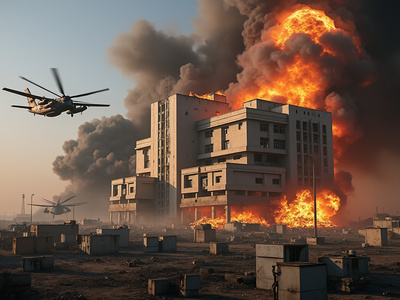
Iran Warns of Nuclear Program Shift Amid U.S. Threats
Iranian officials issue strong statements in response to U.S. President Trump's nuclear deal threats.
Ali Larijani, advisor to Iran's Supreme Leader, has warned that Iran's nuclear program could change direction if the country is attacked by the United States.
This statement comes in the context of rising tensions following threats made by U.S. President Donald Trump, who has indicated a potential military response if a new nuclear agreement is not reached.
In remarks made on Monday, Supreme Leader Ayatollah Ali Khamenei stated that the United States would face a "hard slap" if it acted on Trump's threats.
Larijani emphasized that although Khamenei has issued a fatwa prohibiting nuclear weapons, the Iranian populace might demand their production if faced with aggression from the U.S.
Larijani conveyed that U.S. military action could unwittingly push Iran closer to developing nuclear weapons, suggesting that rational voices in the U.S. acknowledge this reality.
He indicated that Iran has formally communicated its warning regarding Trump's threats to the Swiss embassy in Tehran, which represents U.S. interests and acts as an intermediary between Washington and Tehran.
This warning included Iran's firm commitment to respond "decisively and immediately" to any threats.
Earlier this month, Iran reportedly received a letter from President Trump, allowing a two-month timeframe for Iran to decide on entering new negotiations over its nuclear program, or face potential military action.
Khamenei reiterated during a speech on Eid al-Fitr that if enemies attack Iran, they will receive a strong response, cautioning both the United States and Israel against inciting unrest within Iran.
Larijani criticized the ambiguity in the U.S. position and questioned what the United States wanted from Iran, as well as what it would offer in return.
He downplayed the effectiveness of a military strike on Iran's nuclear program, asserting that even if the U.S. attacked, it would not significantly delay Iran's nuclear advancements, as the country had already implemented necessary precautions.
He described Trump's actions as a global issue that could lead to uncalculated behavior, although he acknowledged this likelihood was low; nonetheless, Iran's military forces remain on high alert.
Larijani also claimed that there are external analyses indicating plans to create chaos within Iran, while simultaneously highlighting movements from abroad.
He asserted that it is impossible to persuade the Iranian people to abandon their revolution.
Larijani accused the United States of exerting pressure on Western nations to deter them from formalizing relations with Iran, noting that while many Western countries wish to establish independent ties with Iran, they refrain from taking decisive action due to U.S. influence.
In defending Iran's involvement in Syria before the downfall of Bashar al-Assad's regime, Larijani remarked that Western media often focus on the costs of Iran's engagement, while Iran's intervention was perceived as a national security necessity.
He argued that cooperating with Russia, Iraq, and Syria in combating terrorism was justified given the common threats faced.
Larijani concluded that this strategy has helped deter enemies from reaching Iran's borders, enhancing regional security and affirming that investment in national security was a prudent decision.
This statement comes in the context of rising tensions following threats made by U.S. President Donald Trump, who has indicated a potential military response if a new nuclear agreement is not reached.
In remarks made on Monday, Supreme Leader Ayatollah Ali Khamenei stated that the United States would face a "hard slap" if it acted on Trump's threats.
Larijani emphasized that although Khamenei has issued a fatwa prohibiting nuclear weapons, the Iranian populace might demand their production if faced with aggression from the U.S.
Larijani conveyed that U.S. military action could unwittingly push Iran closer to developing nuclear weapons, suggesting that rational voices in the U.S. acknowledge this reality.
He indicated that Iran has formally communicated its warning regarding Trump's threats to the Swiss embassy in Tehran, which represents U.S. interests and acts as an intermediary between Washington and Tehran.
This warning included Iran's firm commitment to respond "decisively and immediately" to any threats.
Earlier this month, Iran reportedly received a letter from President Trump, allowing a two-month timeframe for Iran to decide on entering new negotiations over its nuclear program, or face potential military action.
Khamenei reiterated during a speech on Eid al-Fitr that if enemies attack Iran, they will receive a strong response, cautioning both the United States and Israel against inciting unrest within Iran.
Larijani criticized the ambiguity in the U.S. position and questioned what the United States wanted from Iran, as well as what it would offer in return.
He downplayed the effectiveness of a military strike on Iran's nuclear program, asserting that even if the U.S. attacked, it would not significantly delay Iran's nuclear advancements, as the country had already implemented necessary precautions.
He described Trump's actions as a global issue that could lead to uncalculated behavior, although he acknowledged this likelihood was low; nonetheless, Iran's military forces remain on high alert.
Larijani also claimed that there are external analyses indicating plans to create chaos within Iran, while simultaneously highlighting movements from abroad.
He asserted that it is impossible to persuade the Iranian people to abandon their revolution.
Larijani accused the United States of exerting pressure on Western nations to deter them from formalizing relations with Iran, noting that while many Western countries wish to establish independent ties with Iran, they refrain from taking decisive action due to U.S. influence.
In defending Iran's involvement in Syria before the downfall of Bashar al-Assad's regime, Larijani remarked that Western media often focus on the costs of Iran's engagement, while Iran's intervention was perceived as a national security necessity.
He argued that cooperating with Russia, Iraq, and Syria in combating terrorism was justified given the common threats faced.
Larijani concluded that this strategy has helped deter enemies from reaching Iran's borders, enhancing regional security and affirming that investment in national security was a prudent decision.









